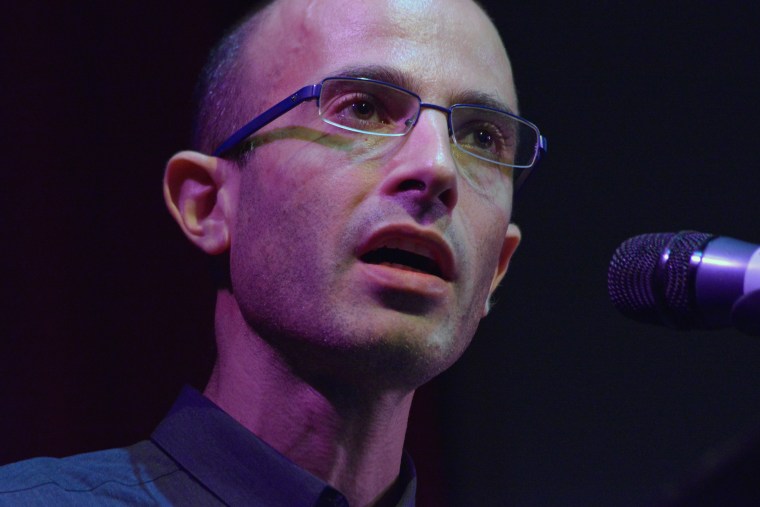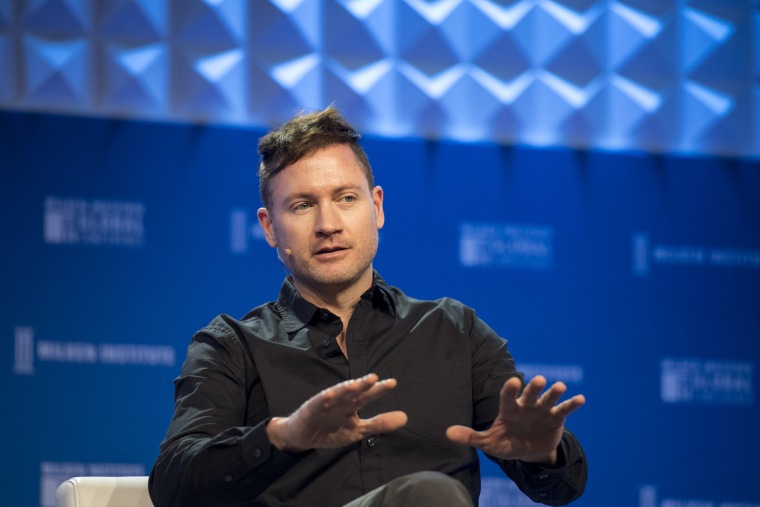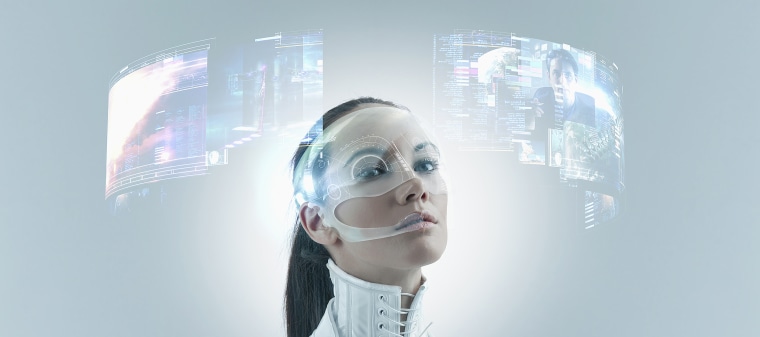Evolution is a slow affair, taking some 5 million years to turn a chimpanzee-like creature into us. But what happens when we push down the accelerator and take command of our bodies and brains instead of leaving it to nature? What happens when biotechnology and artificial intelligence merge, allowing us to re-design our species to meet our whims and desires?
Historian Yuval Noah Harari explores these questions in his runaway bestseller, "Homo Deus: A Brief History of Tomorrow," a kind of sequel to his 2014 book, "Sapiens." The title of his new book suggests a startling stage in our evolution: Homo sapiens (“wise man”), far from being the pinnacle of creation, is a temporary creature, one soon to be replaced by Homo deus (“god man”).
Related: Can Bionic Leaf Solve Our Climate, Energy Problems
“It is very likely, within a century or two, Homo sapiens, as we have known it for thousands of years, will disappear,” Harari told an audience at the Carnegie Council for Ethics in International Affairs recently. “Not because, like in some Hollywood science fiction movie, the robots will come and kill us, but rather because we will use technology to upgrade ourselves — or at least some of us — into something different; something which is far more different from us than we are different from Neanderthals.”
Harari makes no pretense of being able to peer into the future — but the advances humans have made suggest where we may be heading. Breakthroughs in biotechnology, including gene-editing methods like CRISPR, hint at the power we’ll soon have to change our genes, our bodies, and perhaps our brains.
At the same time, advances in artificial intelligence, including machine learning, may soon let us build brain-computer interfaces that will blur the line between man and machine. So far, we’ve muddled along as biological creatures, but we may one day become something new — a novel mix of the biological and the technological; of flesh and silicon.

Harari said we’re already moving in that direction: We depend on our smartphones for a staggering number of decisions every day — and that dependence is growing.
“In 2050, it is likely that your smartphone will not be separate from you at all,” Harari said by e-mail from his home in Israel. “It will be embedded in your body via biometric sensors, and it will monitor your heart rate, your blood pressure, and your brain activity 24 hours a day.” Your smartphone will constantly analyze that data, and “will, therefore, know your desires, likes, and dislikes even better than you.” We see versions of this today, with our Amazon accounts, which seem to know our taste in books and music better than we do.
Blurring the Human-Machine Boundary
Humanity has been through revolutions before, but this one will be different, Harari said. When our ancestors first picked up stone tools to hack away at an animal carcass, some 2 million years ago, it was a game-changer — but it primarily changed our culture, not our bodies. Now we’re entering a new era, in which rather than using tools, the tools might be using us.
“People are delegating more responsibility to AI and they are already merging with their smartphones and their Facebook accounts,” Harari said. “These are no longer dumb tools like a hammer or a knife — they are intelligent entities that constantly study us, adapt to our unique personality, and actively shape our worldview and our innermost desires.”
"We will use technology to upgrade ourselves ... into something different."
In the future Harari envisions, we’ll gradually merge with machines thanks to biometric sensors and brain-computer interfaces. This may sound like science fiction, but it’s already a reality. At Miguel Nicolelis’s lab at Duke University’s Center for Neuroengineering, patients with spinal cord injuries can use a brain-machine interface to control a motorized “exoskeleton” to regain some sensation and muscle control in damaged limbs.
“Humans will merge with computers and machines to form cyborgs — part-organic, part-bionic life forms,” Harari said. “You could surf the Internet with your mind; you could use bionic arms, legs, and eyes; you will augment your organic immune system with a bionic immune system, and you will delegate more and more decisions to algorithms that know you better than you know yourself.”
At first, you may feel a sentimental attachment to the traditional human form. Looking recognizably like Homo sapiens, we might soon be able to select “designer bodies,” as though shopping from a catalog, Harari speculates.
“However, in the longer term — perhaps in the 22nd century — the human body is likely to lose its relevance and appeal,” he said. As our mastery over materials progresses, we may go “beyond material structures altogether. We might reach a point when minds could surf cyberspace directly, and adopt there any kind of form we fancy, irrespective of the laws of biology or even physics.”
Transcending Space and Time
The way we understand space and time may also change, Harari said. “Today we have organic bodies, hence at any one time, we can be only in one place. But a future cyborg may have an organic brain connected via a brain-computer interface to numerous arms, legs, and other tools that could be scattered all over the world. Your brain could be in New York, while your hands will be fighting insurgents in Afghanistan or performing heart surgery in Egypt. So where are you?”
Whether the homo deus species is “human” is a philosophical question, not a scientific one. But Harari believes these changes will come gradually as our relationship with the machines becomes slowly but inexorably more intimate. Our species “is likely to upgrade itself step by step, merging with robots and computers in the process,” he wrote in his latest book, “until our descendants will look back and realise they are no longer the kind of animal that wrote the Bible, built the Great Wall of China, and laughed at Charlie Chaplin’s antics.”
Humankind’s relationship with technology has always been complex. “We’ve always sort of been merged with technology,” said journalist Mark O’Connell, author of the new book “To Be a Machine.” “We’re already cyborgs, in a sense, because we’re in this relationship with technology which is very intimate." The coming of the smartphone — which many of us put down only when we’re asleep or in the shower — has taken this relationship to the next level. “Your phone is a cyborg technology, in a way. It’s not physically internalized — but the phone is like an extra limb or an extrasensory device.”
Traditionally, technology has been located outside the body, but more and more often it’s inside — where it takes on more personal significance. Think of the difference between eyeglasses, which touch the body, and a pacemaker, which lies next to the heart.
“I feel like there’s a very strong, profound distinction between just using technology and integrating technology” into our bodies, O’Connell said.
Mind 2.0?
When body and machine merge, what happens to the mind? As Harari admitted in "Homo Deus," the nature of consciousness remains a deep mystery. That’s why, despite AI advancements, our efforts to create a “thinking machine” haven’t lived up to expectations.
“We’ve seen an amazing development in computer intelligence, but exactly zero development in computer consciousness,” Harari said. Part of the problem is that we often confuse intelligence, which he defines as the ability to solve problems, with consciousness — the ability to feel. Yet, he said, we may one day find a way around this divide, eventually reaching a state of “super-intelligence."
Not surprisingly, the schemes for enhancing human intelligence seem to be coming from Silicon Valley. Bryan Johnson, a tech entrepreneur who made his fortune by selling eBay, now heads a startup called Kernel, which is developing computerized brain implants that can help people with neurological damage caused by strokes or Alzheimer’s disease. With help from neuroscientists, Johnson hopes to go further. He’d like to use the technology to boost memory and even intelligence. As Johnson told the Washington Post last year: “Whatever endeavor we imagine — flying cars, go to Mars — it all fits downstream from our intelligence. It is the most powerful resource in existence. It is the master tool.”

Heaven Can Wait
Harari won’t say whether we will conquer death, but he’s confident we’ll “make a bid” for immortality this century. In fact, our attitude toward death has changed since the Scientific Revolution, he said. Science “has redefined death as a technical problem. A very complicated problem, no doubt, but still only a technical problem.”
And technical problems have technical solutions. “If traditionally death was the specialty of priests and theologians, now the engineers are taking over,” Harari said. That doesn’t mean we’ll be able to pull it off — but he doesn’t dismiss the idea. “My position is that humankind has the potential to overcome old age and death, but it will probably take a few centuries rather than a few decades.”
But if people stop dying, won’t the world get crowded?
“Only the rich will stop dying,” Harari said, “and there aren’t many of them.” This raises a dire vision of the world in which the ultra-wealthy have access to life-extending modifications — perhaps even immortality — while the majority live in a constant state of resentment. If only the rich can be immortal, the poor won’t stand for it, Harari said.
“We’re already cyborgs, in a sense, because we’re in this relationship with technology which is very intimate."
“Those unable to afford the new miracle treatments — the vast majority of people — will be beside themselves with rage,” he said. “Throughout history, the poor and oppressed comforted themselves with the thought that at least death is even-handed — that the rich and powerful will also die. The poor will not be comfortable with the thought that they have to die, while the rich will remain young and beautiful forever.”
Even if immortality is never achieved, the unequal availability of life-extending procedures will take a toll on society, Harari said. “We might see the emergence of the most unequal societies that ever existed… economic inequality will be translated into biological inequality.”
People will still have to work for a living, but what sort of work is impossible to predict. “Nobody knows what the job market will look like in 2050, except that it will be completely different from today,” Harari said. Many familiar jobs will have disappeared, and new ones will arise. But the direction we’re moving in suggests that a “post-work world” is on the horizon. “The idea of going to the office to earn a living would sound as strange as the idea of going to the forest to hunt your dinner.”
Divine Data
The office isn’t the only place that may soon be redundant. Churches, Harari suggested, may fade into history along with the very idea of religion. As he points out, the things that God does in Genesis — creating plants, animals, and people — may soon be things that humans can do. We’ll see these new gods every time we look in the mirror. If making things no longer seems miraculous, what would?
As artificial intelligence progresses, and the power of algorithms and data-crunching dominates more aspects of our lives, Harari wonders whether data may come to have divine properties. In the future, “techno-religions” may conquer the world, he said, not by promising salvation in the next world, but by radically changing our lives in this world.
Related: Can Hacking the Planet Stop Runaway Climate Change?
Harari argued that “the most interesting place in the world from a religious perspective is not the Islamic State or the Bible Belt, but Silicon Valley.” The technology gurus “promise all the old prizes — happiness, peace, prosperity, and even eternal life — but here on earth with the help of technology, rather than after death with the help of celestial beings.”
There is much in Harari’s vision to inspire awe; there is also much to fear. But Harari himself seemed more sanguine — though he acknowledged that, as humanity takes on unprecedented new powers, we will also have to embrace equally great responsibility.
We may not be ready. But, Harari added, “that has never stopped us before.”
Dan Falk (@danfalk) is a science journalist based in Toronto. His books include The Science of Shakespeare and In Search of Time.
